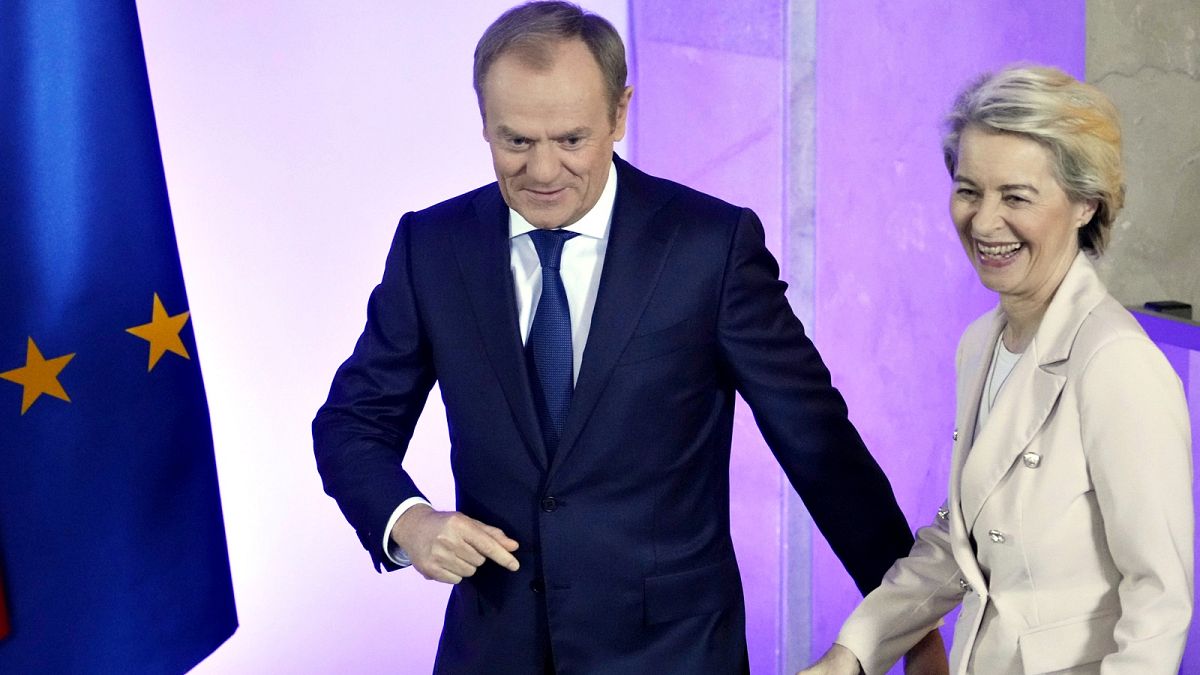Brussels to unblock €137 billion in EU funds for Poland as soon as next week
The European Commission is preparing to unblock up to €137 billion in cohesion and recovery funds for Poland, which until now has been unable to access the cash over rule-of-law concerns. The announcement was made by President Ursula von der Leyen during a trip to Poland on Friday, where she spoke next to Prime Minister […]



The European Commission is preparing to unblock up to €137 billion in cohesion and recovery funds for Poland, which until now has been unable to access the cash over rule-of-law concerns.
The announcement was made by President Ursula von der Leyen during a trip to Poland on Friday, where she spoke next to Prime Minister Donald Tusk.
The breakthrough comes days after Polish officials travelled to Brussels to present an “action plan” of nine draft bills aimed at restoring judicial independence from the country’s highest tribunal to the lower courts.
“We are impressed by your efforts and those of the Polish people to restore the rule of law as the backbone of your society. A society where everyone plays by the rules. A society where people and businesses can trust the institutions and can hold authorities to account,” von der Leyen said after meeting the premier.
“Based on the reforms you have launched and the number of immediate steps you have taken on judicial independence, I have good news: next week the College (of Commissioners) will come forward with two decisions on European funds that are currently blocked for Poland. These decisions will free up to €137 billion for Poland.”
Brussels denied the previous hard-right Polish government of Law and Justice (PiS) access to €76.5 billion in cohesion funds allocated for the 2021-2027 period over a range of rule-of-law deficiencies, mostly centred on a persistent decline of judicial independence and growing political interference in the courts.
The concerns also hindered Poland’s ability to fully utilise its post-COVID-19 recovery and resilience plan, which combines €34.5 billion in low-interest loans and €25.3 billion in grants. Only €5.1 billion in “pre-financing” has been released so far.
Upon coming into power in mid-December, Tusk vowed to reset the relations between Brussels and Warsaw, restore democracy and release the frozen funds, which the country urgently needs to pay for development projects to accelerate the green and digital transitions.
Poland moved quickly to request a first payment of €6.3 billion in grants and loans from the recovery pot and submit a self-assessment for the cohesion funds. This triggered the Commission’s internal process to verify the fulfilment of judicial conditions.
“We got really what we wanted. This is a very crucial day for us because we’ve done a lot. A huge effort has been done. Polish citizens chose democracy and the rule of law on the 15th of October and they are the real heroes of Polish history,” Tusk said, referring to the last elections. “This is a lot of money. And we will use it to tackle those important challenges that we are dealing with now.”
Even if the Commission adopts the decisions next week, the disbursements will not be immediate nor absolute. Cohesion funds are paid out gradually according to the evolution of projects on the ground.
Meanwhile, recovery funds are split into tranches and are strictly attached to the completion of reforms and investments. Member states have until August 2026 to carry out their commitments.
Both envelopes of money are linked to the restoration of judicial independence and compel the Polish government to undo the effects of the controversial changes introduced by PiS, particularly regarding the disciplinary chamber of the Supreme Court, which was empowered to punish magistrates according to their rulings.
Last year, the European Court of Justice (ECJ) unambiguously struck down the judicial overhaul, arguing it was “incompatible with the guarantees of access to an independent and impartial tribunal.”














